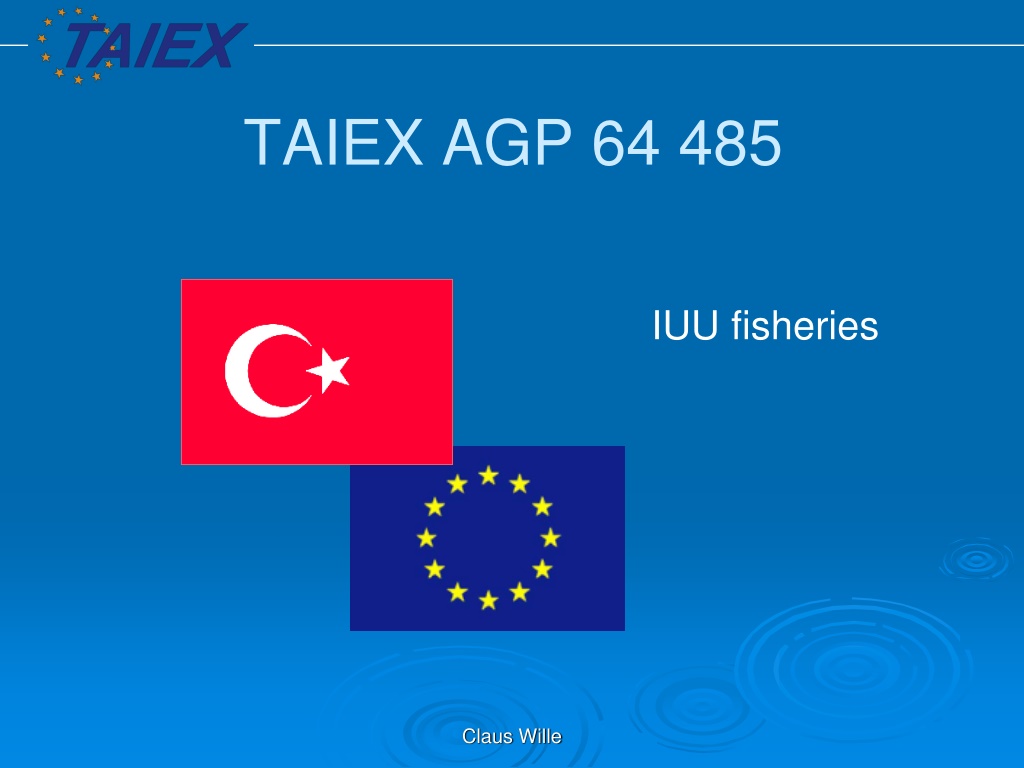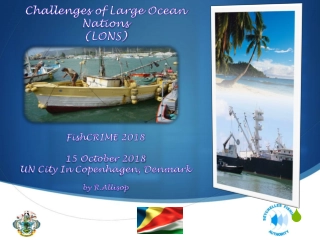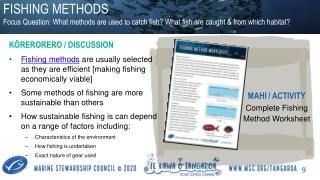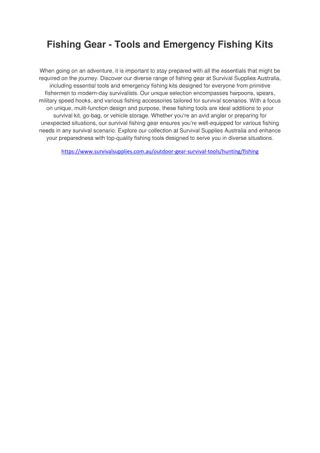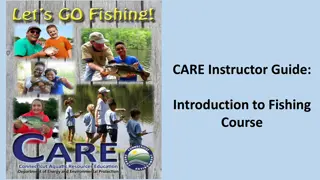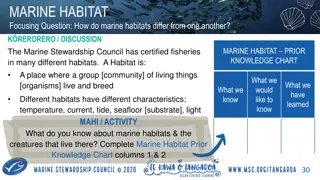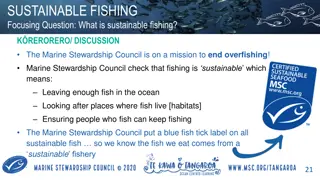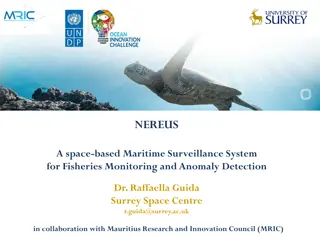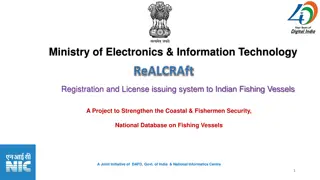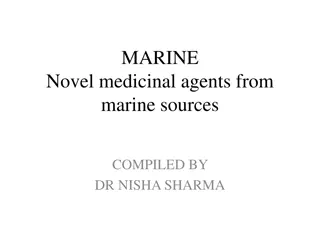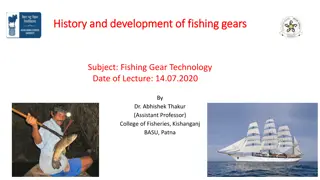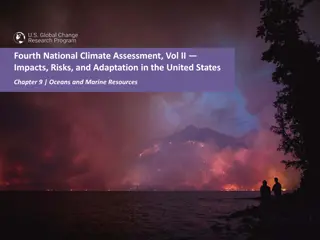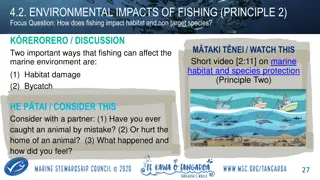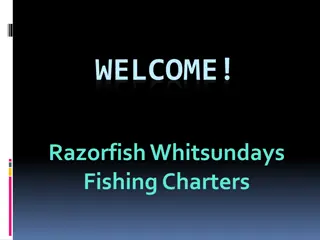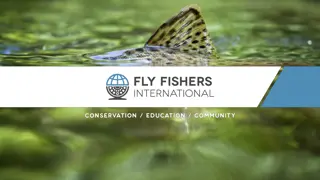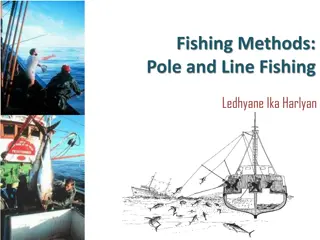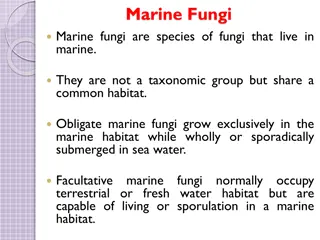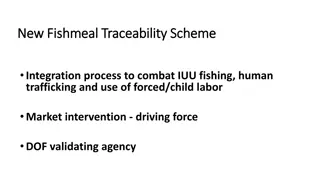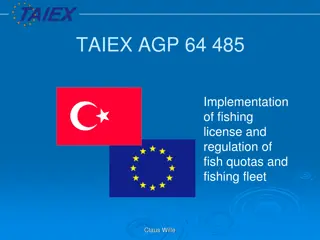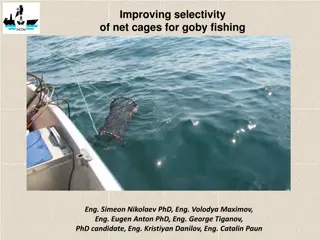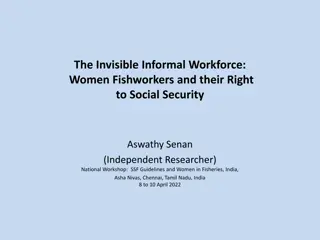Understanding IUU Fishing and Its Impact on Marine Resources
IUU fishing, which includes illegal, unreported, and unregulated fishing activities, poses a significant threat to marine ecosystems and sustainable fisheries management. The IUU Council Regulation No. 1005/2008 outlines measures to prevent and eliminate such practices, such as designated ports, catch certificates, and inspections. Claus Wille's images visually depict the complexities of IUU fishing and the necessity of international cooperation in combating these illicit activities.
Download Presentation

Please find below an Image/Link to download the presentation.
The content on the website is provided AS IS for your information and personal use only. It may not be sold, licensed, or shared on other websites without obtaining consent from the author. Download presentation by click this link. If you encounter any issues during the download, it is possible that the publisher has removed the file from their server.
E N D
Presentation Transcript
TAIEX AGP 64 485 IUU fisheries Claus Wille
IUU Council Regulation No. 1005/2008 of 29 September 2008 establishing a Community system to prevent, deter and eliminate illegal, unreported and unregulated fishing Designated ports Prior notification of landing Catch certificate Inspection The community IUU vessel list The list of non-cooperation third countries Claus Wille
Illegal fishing illegal fishing means fishing activities: (a) conducted by national or foreign fishing vessels in maritime waters under the jurisdiction of a State, without the permission of that State, or in contravention of its laws and regulations; (b) conducted by fishing vessels flying the flag of States that are contracting parties to a relevant regional fisheries management organisation, but which operate in contravention of the conservation and management measures adopted by that organisation and by which those States are bound, or of relevant provisions of the applicable international law; or (c) conducted by fishing vessels in violation of national laws or international obligations, including those undertaken by cooperating States to a relevant regional fisheries management organisation; Claus Wille
Unreported fishing unreported fishing means fishing activities: (a) which have not been reported, or have been misreported, to the relevant national authority, in contravention of national laws and regulations; or (b) which have been undertaken in the area of competence of a relevant regional fisheries management organisation and have not been reported, or have been misreported, in contravention of the reporting procedures of that organisation; Claus Wille
Unregulated fishing unregulated fishing means fishing activities: conducted in the area of application of a relevant regional fisheries management organisation by fishing vessels without nationality, by fishing vessels flying the flag of a State not party to that organisation or by any other fishing entity, in a manner that is not consistent with or contravenes the conservation and management measures of that organisation; or a) conducted in areas or for fish stocks in relation to which there are no applicable conservation or management measures by fishing vessels in a manner that is not consistent with State responsibilities for the conservation of living marine resources under international law; b) Claus Wille
Engaged in IUU fishing A fishing vessel shall be presumed to be engaged in IUU fishing if it is shown that, contrary to the conservation and management measures applicable in the fishing area concerned, it has: fished without a valid licence, authorisation or permit issued by the flag State or the relevant coastal State; or not fulfilled its obligations to record and report catch or catchrelated data, including data to be transmitted by satellite vessel monitoring system, or prior notices; or fished in a closed area, during a closed season, without or after attainment of a quota or beyond a closed depth; or Claus Wille
Engaged in IUU fishing engaged in directed fishing for a stock which is subject to a moratorium or for which fishing is prohibited; or used prohibited or non-compliant fishing gear; or falsified or concealed its markings, identity or registration; or concealed, tampered with or disposed of evidence relating to an investigation; or obstructed the work of officials in the exercise of their duties in inspecting for compliance with the applicable conservation and management measures; or the work of observers in the exercise of their duties of observing compliance with the applicable Community rules; or taken on board, transhipped or landed undersized fish in contravention of the legislation in force; or Claus Wille
Engaged in IUU fishing transhipped or participated in joint fishing operations with, supported or re-supplied other fishing vessels identified as having engaged in IUU fishing under this Regulation, in particular those included in the Community IUU vessel list or in the IUU vessel list of a regional fisheries management organisation; or carried out fishing activities in the area of a regional fisheries management organisation in a manner inconsistent with or in contravention of the conservation and management measures of that organisation and is flagged to a State not party to that organisation, or not cooperating with that organisation as established by that organisation; or no nationality and is therefore a stateless vessel, in accordance with international law. Claus Wille
Inspection in port schemes With a view to prevent, deter and eliminate IUU fishing, an effective scheme of inspections in port for third country fishing vessels calling at the ports of Member States shall be maintained. Access to ports of Member States, the provision of port services, and the conduct of landing or transhipment operations in such ports shall be prohibited for third country fishing vessels unless they meet the requirements laid down in this Regulation, Transhipments between third country fishing vessels or between the latter and fishing vessels flying the flag of a Member State shall be prohibited in Community waters and shall take place only in port. Claus Wille
Designated ports Member States shall designate ports, or places close to the shore, where landings or transhipment operations of fishery products and port services are permitted. Claus Wille
Prior notice Masters of third country fishing vessels or their representatives shall notify the competent authorities of the Member State whose designated port or landing facilities they wish to use at least three working days before the estimated time of arrival at the port, of the following information: vessel identification; name of the designated port of destination and the purposes of the call, landing, transhipment or access to services; fishing authorisation or, where appropriate, authorisation to support fishing operations or to tranship fishery products; dates of the fishing trip; estimated date and time of arrival at port; Claus Wille
Prior notice the quantities of each species retained on board or, where appropriate, a negative report; the zone or zones where the catch was made or where transhipment took place, whether in Community waters, in zones under the jurisdiction or sovereignty of a third country or on the high seas; the quantities for each species to be landed or transhipped Claus Wille
Authorisation A third country fishing vessel shall be granted authorisation to access the port only if the information set out is complete and, if the third country vessel carries on board fishery products, is accompanied by the catch certificate. Authorisation to commence landing or transhipment operations in port shall be subject to a check to determine the completeness of the information submitted as prescribed, and where appropriate, to an inspection carried out. Claus Wille
Recording of landing Recording of landing or transhipment operations Masters of third country fishing vessels or their representative shall submit to the authorities of the Member State whose designated ports of landing or transhipment facilities they use, if possible by electronic means prior to landing or transhipment operations, a declaration indicating the quantity of fishery products by species to be landed or transhipped, and the date and place of each catch. Masters and their representatives shall be held responsible for the accuracy of such declarations. Claus Wille
Inspection Member States shall carry out inspections in their designated ports of at least 5 % of landing and transhipment operations by third country fishing vessels each year Claus Wille
Inspection procedure Officials in charge of inspections (officials) shall be able to examine all relevant areas, decks and rooms of the fishing vessel, catches processed or not, nets or other gear, equipment and any relevant documents which officials deem it necessary to verify in compliance with applicable laws, regulations or international management and conservation measures. Officials may also question persons deemed to have information on the matter subject to inspection. Inspections shall involve the monitoring of the entire landing or transhipment operations and include a cross-check between the quantities by species recorded in the prior notice of landing and the quantities by species landed or transhipped. Claus Wille
Inspection procedure Officials shall sign their inspection report in the presence of the master of the fishing vessel, who shall have the right to add or cause to be added any information that he considers relevant. Officials shall indicate in the logbook that an inspection has been made. A copy of the inspection report shall be handed over to the master of the fishing vessel, who may forward it to the owner. The master shall cooperate with and assist in the inspections of the fishing vessel and shall not obstruct, intimidate or interfere with the officials in the performance of their duties. Claus Wille
Catch certificates The importation into the Community of fishery products obtained from IUU fishing shall be prohibited. To ensure the effectiveness of the prohibition, fishery products shall only be imported into the Community when accompanied by a catch certificate in conformity with the Regulation. The catch certificate shall be validated by the flag State of the fishing vessel or fishing vessels which made the catches from which the fishery products have been obtained. It shall be used to certify that such catches have been made in accordance with applicable laws, regulations and international conservation and management measures. Claus Wille
Verification The competent authorities of the Member States may carry out all of the verifications they deem necessary to ensure that the provisions of this Regulation are correctly applied. Verifications may, in particular, consist in examining the products, verifying declaration data and the existence and authenticity of documents, examining the accounts of operators and other records, inspecting means of transport, including containers and storage places of the products and carrying out official enquiries and other similar acts, in addition to the inspection of fishing vessels at port. Claus Wille
Verification Verifications shall be carried out, in any case, where: (a) the verifying authority of the Member State has grounds to question the authenticity of the catch certificate itself, of the validation seal or of the signature of the relevant authority of the flag State; or (b) the verifying authority of the Member State is in possession of information that questions the compliance by the fishing vessel with applicable laws, regulations or conservation and management measures, or the fulfilment of other requirements of this Regulation; (c) fishing vessels, fishing companies or any other operators have been reported in connection with presumed IUU fishing, including those fishing vessels which have been reported to a regional fisheries management organisation under the terms of an instrument adopted by that organisation to establish lists of vessels presumed to have carried out illegal, unreported and unregulated fishing Claus Wille
Refusal of importation The competent authorities of the Member States shall, where appropriate, refuse the importation into the Community of fishery products without having to request any additional evidence or send a request for assistance to the flag State where they become aware that: the importer has not been able to submit a catch certificate for the products concerned the products intended for importation are not the same as those mentioned in the catch certificate; the catch certificate is not validated by the public authority of the flag State the catch certificate does not indicate all the required information; the importer is not in a position to prove that the fishery products comply with the regulation Claus Wille
Refusal of importation a fishing vessel figuring on the catch certificate as vessel of origin of the catches is included in the Community IUU vessel list or in the IUU vessel lists the catch certificate has been validated by the authorities of a flag State identified as a non-cooperating State Claus Wille
The Community IUU vessel list The Commission shall, establish a Community IUU vessel list. The list shall include the fishing vessels in relation to which, the information obtained in accordance with this Regulation establishes that they are engaged in IUU fishing and whose flag States have not complied with the official requests, in response to such IUU fishing. https://ec.europa.eu/fisheries/cfp/illegal_fishing/info Claus Wille
Non-cooperating third countries The Commission, shall identify the third countries that it considers as non-cooperating third countries in fighting IUU fishing. The identification shall be based on the review of all information obtained or, as appropriate, any other relevant information, such as the catch data, trade information obtained from national statistics and other reliable sources, vessel registers and databases, catch documents or statistical document programmes and IUU vessel lists adopted by regional fisheries management organisations, as well as any other information obtained in the ports and on the fishing grounds. A third country may be identified as a non-cooperating third country if it fails to discharge the duties incumbent upon it under international law as flag, port, coastal or market State, to take action to prevent, deter and eliminate IUU fishing Claus Wille
